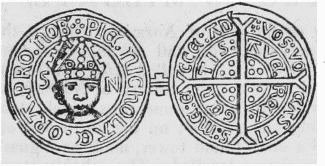Pages 523-524
An Essay Towards A Topographical History of the County of Norfolk: Volume 4, the History of the City and County of Norwich, Part II. Originally published by W Miller, London, 1806.
This free content was digitised by double rekeying. All rights reserved.
In this section
BRAKENDON, BRAKENDALE,
The braky-downs, or hills, so called from the brakes formerly growing there: it lies between Lakenham and the city walls, and had a chapel placed on the hill, which was much frequented by fishermen and watermen, who used to come hither to offer to good St. Nicholas, their patron saint, to whose honour this chapel was dedicated. If they made an agreeable offering, they had a bulla or round piece of lead, given them, exactly like this impression, one of which now remains in the hands of Anthony Norris, Esq. of Norwich, to whom I am obliged for the copy. The words allude to the following story in his legend, (fn. 1)

"On a Day as a Shyppe wyth Marreners were in peryshynge on the See, they prayed & required devoutly Nycolas Servaunt of God, sayeing, [Pie Nicholœ Ora pro Nobis] yf those Thynges that we have herde of the sayd, ben True, preve theym now: And anone a Man apered in lyknes, and sayd, [Vos vocastis me, Ecce Adsum; Ave Rex Gentis.] Loo see ye me not: ye called me. And thenne he began to helpe theym in their exployte of the See, And Anone the Tempest ceased. And when they were come to hys Churche, they knewe hym, & yet they had never seen hym; And thenne they thanked God & hym, of theyr Deliveraunce; & he bad theym attribute it the Mercy of God, & to theyre byleve, and nothynge to hys Merytes."
It was founded by Coleburn the priest, in the Conqueror's time, (fn. 2) who with the King's license gave 20 acres of land lying round it, valued at 2s. to find a priest to say mass and chant the psalter every week, in the chapel, for the King's welfare. The advowson belonged to the Crown, and was purchased by Bishop Eborard of King Stephen, (fn. 3) and by him settled on the convent's infirmary; and afterwards it was appropriated to the celerer of the monastery, (fn. 4) and being in the liberty of the Prior, was exempt from archidiaconal jurisdiction. In 1428, it was taxed as a parochial chapel, endowed with lands and tithes, at 20s. and paid 2s. to every tenth. It had a large churchyard; for in the accounts I find it was let out to be fed, and it was served by the same person that served Lakenham. In Edward the Second's time, this was returned as a hamlet to Lakenham; that the Prioress of Carrow's manor included one part of it, which always attended that house, and still belongs to it, and the lordship of Lakenham the other; with which manor it still remains.
The Prior of Norwich was taxed for his temporals here, at 12s. 2d. q. the Prioress of Carrow at 4s. 4d. and the Prior of St. Faith's at 6d.
The chapel was pulled down at the Dissolution, and there are no ruins to be seen, though the place where it stood is still known. See p. 75, 6.)
This hamlet, and part of Lakenham, and that part of Trowse, which lies on the western side of the river, and is called
Trows Milgate,
Are in the county of the city of Norwich, (though they were formerly in Humbleyard hundred,) and are laid to the wards of South Conisford and Berstreet: it was called Miltgate, from the water-mill standing on the river here; the county of Norfolk, and liberty of Norwich, was divided by a tall stone cross which stood on Trowsebridge, and is lately taken down; on the north part of the east side of the river, stood a small round tower, made as a guard for the passage, but it is now almost levelled. The inhabitants of this hamlet used to receive the sacraments, &c. at St. Etheldred's church in Conisford, as you may see at p. 75. The church is dedicated to St. Andrew, but as it is in Norfolk, the account of it and its parish doth not belong to this county, for which reason, I shall omit any further mention of it here.


